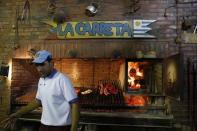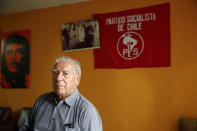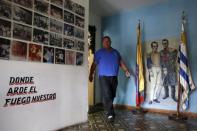Latin American leftist exiles hold faith in Maduro's Venezuela
By Alexandra Ulmer CARACAS (Reuters) - Venezuela's aging community of fugitives from 1970s South American dictatorships are staying loyal to their revolutionary roots and defending President Nicolas Maduro at one of his "Chavista" socialist movement's lowest ebbs. Thousands of young leftists escaped right-wing military rule in Argentina, Chile and Uruguay by finding refuge in then booming and relatively peaceful Venezuela. Decades on, some are among the most hard-line backers of the late Hugo Chavez's "revolution" even as the increasingly unpopular Maduro wrestles with a ballooning economic crisis exacerbated by tumbling oil prices. Though critical of corruption and bureaucracy in government, and well aware Maduro lacks the charisma of his larger-than-life predecessor, the old guard is nevertheless chafing at what they consider a U.S. plot to annihilate Maduro reminiscent of events in South America during the Cold War. Chilean Tomas Perez, who was head of propaganda for president Salvador Allende in the 1970s, blamed Venezuela's wealthy elite, in cahoots with the United States, for hoarding goods and fomenting social unrest to subvert the government. "We're suffering all of the empire's attacks," says Perez, who lived through Chile's 1973 coup that toppled socialist Allende and led to Augusto Pinochet's 17-year dictatorship. As police raided his house and detained his brother, Perez - whose Communist parents gave him the middle name Lenin - escaped to Venezuela, where he later fell in love with "Chavismo" and designed food labels for government supermarkets. "My life was stunted in Chile. Chavez gave me the chance to finish what I left," says 66 year-old Perez in a cluttered workshop brimming with posters of Chavez, Allende, political flyers - and cats. "This is my revenge on life," he adds, as his pony-tailed salt-and-pepper hair and long beard brush over a red t-shirt. After his 1998 election, Chavez initially entranced leftists with his passionate condemnations of rapacious capitalism and generous social programs. Foes in turn denounced him as an autocratic populist, and some high-profile leftist intellectuals lost their faith in him over the years. Though figures are scarce on political exiles to Venezuela, Chile's consulate does estimate at least 3,000 of its nationals came during the Pinochet era. An estimated 25,000 Argentines and 35,000 Chileans currently live in Venezuela, diplomats say. Novelist Isabel Allende, cousin of the late president, was exiled in Venezuela for 13 years. NOSTALGIA FOR 'CHE' AND ALLENDE The vibrant Uruguayan center in Caracas, home to a traditional grill, tango classes and photos of soccer star Diego Forlan, has about 800 members. Hamlet Tabarez, the center's president and a socialist who found refuge in Venezuela in the 1970s, even wrote a "murga,", a traditional Uruguayan song, dedicated to Chavez. "There's an 'economic war' going on," he says. "They did it to Allende and they're doing it to Maduro." He and others point to the United States' tacit backing of a two-day coup against Chavez in 2002 as evidence of their still-latent intentions in the oil-rich OPEC nation. "What's our concern? That no one interfere here," says Adriel Seguel, 76, framed by photos of Argentine guerilla Ernesto "Che" Guevara and a Socialist Party flag, at a Chilean exile hangout in central Caracas. Domestic foes scoff at such diehard support for Venezuela's government, especially from foreigners, whom they say fail to understand how Chavez-era policies have destroyed the economy. Poor Venezuelans are, indeed, beginning to sour on Maduro as they suffer rampant inflation, chronic shortages of basic goods due to currency controls and sky-high crime. While most of the exiles interviewed by Reuters leapt to defend Maduro, there was also disquiet at what some deem a betrayal of revolutionary purity. "This is not the left. There is no revolution here. It's a complete lie. This is a rob-olution," complains one 67-year-old Uruguayan, asking not to be named for fear over his business. "They've lied to the people so much. But people are sleeping lions. Sooner or later there will be unrest," says the former union leader who fled Uruguay's 1973-1985 military rule and says he always distrusted Chavez, a former soldier. With his daughter and two grandkids thinking of moving to Uruguay to escape crime in Venezuela, he might not be around to watch Maduro's presidency play out. "If they go, I will too," he says, resigned. In contrast to the 20th century, when an oil boom lured immigrants, many in Venezuela's middle classes are now emigrating due to lack of opportunities. There has been a recent uptick in Chileans departing "due to the socio-political situation," according to the country's consulate. Many also returned when Pinochet's rule ended. Gabriel Braguinsky, an Argentine who was detained and tortured in the 1970s before he fled to Venezuela, says the "economic war" is harder to fight under Maduro. "He doesn't have Chavez's same capabilities," he laments. While deploring Venezuela's corruption, excessive bureaucracy and deteriorating infrastructure, Braguinsky says he is still firmly behind the government - which he sees as a consequence of the region's bloody history. "Chavez emerged due to poverty, graft, bureaucracy, his own talent and what happened in Chile, Argentina and Uruguay." (Editing by Andrew Cawthorne and W Simon)

 Yahoo News
Yahoo News 









